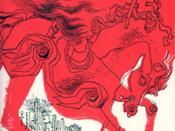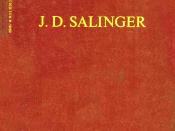The Catcher in the Rye by J.D. Salinger is a story of Holden Caulfield?s quest to find himself, and his place, in the world. The novel opens with Caulfield writing from the psych ward of a mental facility. Some readers may feel that his residency there was warranted for many reasons, failing out of school for the second time being one. However, one must consider the circumstances under which he found himself there and the time period during which the novel takes place. While some argue that he was in need of mental care, Caulfield was nothing more than a young man trying to find himself, and his place, in the world.
The reasons for Caulfield?s unhappiness with the world are obvious: the death of his brother Allie, the suicide of one of his friends, his failures at more than one school, his inability to connect with others. He is troubled and has a total indifference towards his future; but is he really depressed? Depressed enough to be admitted into a psych ward? To argue the point would be to take the plot out of its setting.
One cannot ignore the fact that the events unfold in the 1950?s. World War II had just ended. This was a point in time when people were committed for being anything other than ?normal?. His parents? perception of failure as outside the ?norm? is what ultimately landed him writing from a mental institution. Although he does speak of feeling ?depressed? throughout the novel, this does not qualify him as such, nor does his parents? perspective. He does grow increasingly disheartened as the novel progresses. After a fight in his dorm before he leaves Pencey Prep, he says, ?I felt so lonesome, all of a sudden. I almost wished I was dead? (48). He confides in his dead brother when he claims to be really down. ?I started talking, sort of out loud, to Allie. I do that sometimes when I get depressed? (98).
Those who argue that Caulfield?s stay in a mental institution was warranted would say that his panic attacks towards the end of the novel prove his clinical depression. While trying to cross the street, he begins to talk to his dead brother, fearing that he will disappear with every step.
Caulfield?s perception of the world could be read as manic rambling, with great highs and lows. His view of everyone else being phony leads to his pathological lying and own phoniness. He says, ?I?m the most terrific liar you ever saw in your life?Once I get started, I can go for hours if I feel like it? (16, 58). He is quite introspective of his own phoniness.
Rather than work towards becoming a mature adult, like most teenagers Caulfield resists it. He labels all others as ?phonies?. He isolates himself from others. In the end, it is only his sister Phoebe that he cannot leave behind. He protects himself with his sarcasm and cynicism of the world around him, apart from him. After his encounter with Mr. Antolini, he sleeps on a park bench. ?I think I was more depressed then than I ever was in my life? (194). What he deems as his own depression is nothing more than a realization, an awakening to the fact that people were not ?phonies?, but real, no matter how good or evil. He sees for the first time through Mr. Antolini realness in people. Mr. Antolini exposes his true feelings to Caulfield, no matter how unconventional.
This awakening is preceded by a discussion between Caulfield and Mr. Antolini, regarding Caulfield?s studies or lack thereof. He offers Caulfield a new perspective on his education, saying, ?The mark of the immature man is that he wants to die nobly for a cause, while the mark of the mature man is that he wants to live for one? (188). From this perspective, Caulfield?s consciousness is on its way to a new awareness.
However, one cannot analyze Caulfield without remembering themselves at his age or during a period of great change. He is growing into maturity and at the same time resisting it. He is afraid of change and nearly overwhelmed by it. While visiting the Museum of Natural History, he views the statues of the Eskimos and Indians. He says, ?Certain things should stay the way they are?You ought to be able to stick them in one of those glass cases and just leave them alone? (122). Surely he refers to a time before the loss of his brother and the beginning of his downward spiral into discontent.
Caulfield?s loneliness is both his downfall and his protector. He alienates himself from others in order to protect himself from reality. He is none different than any teenager his age would be, given the circumstances. At his age, he has already dealt with loss, grief, and failure. He deals with it typical of any sixteen year old. In a different, more modern time, Caulfield would probably not be committed in to a psych ward for feeling depressed. His parents being wealthy, nowadays he may find himself talking to a psychiatrist or even taking a pill.
But he was not clinically depressed. He was a teenager trying to find himself, at a crossroads in his life. He is in a period of discovery, between childhood and adulthood. Although he states several times that he is depressed and feels like dying, these are nothing more than emotional expressions of a sixteen year old boy. He rambles throughout the novel, unaware of the significance of his words, the possible meaning others perceive behind them. His parents? misconception is what ultimately leads to his commitment. His expression of emotion, however sarcastic, his perceived as honest. He himself states that he is ?the most terrific liar you ever saw? (16).
It would be easy to get caught up in Caulfield?s view of the world instead of digging in to what is ?wrong? with him. Anyone who is the least bit sarcastic on a semi-daily basis can see themselves in Caulfield. The success in Salinger?s work lies in his ability to write to an all-identifiable audience. No matter what background, readers can identify with Caulfield?s expressive discontent with the world as it is. We have all been there, feeling the world as a cold and lonely place, whether we were sixteen at the time or not.
Caulfield represents any typical teenager going through a period of change. This time in his life was not a good one, he had suffered many losses. Life is stacked against him, while at the same time unfolding before him. He has the power within himself to change his life?s course, but doesn?t realize it until it?s nearly too late.





